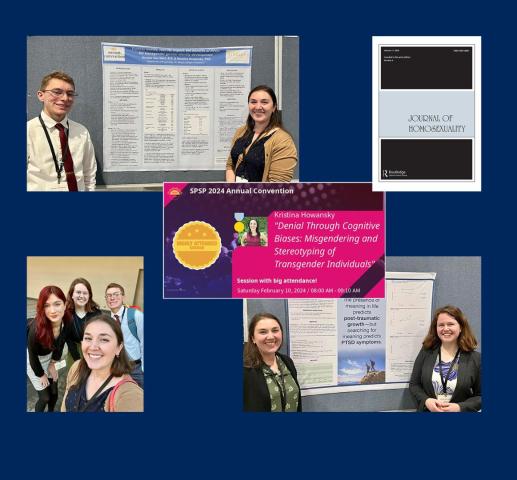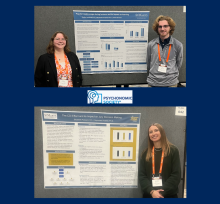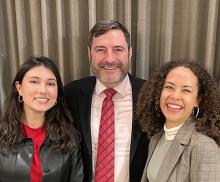
Alumni April Fraser '23 and Sonder Van Wert '23 and Assistant Professor of Psychology Kristina Howansky presented research at the 25th Annual Meeting of the Society for Personality and Social Psychology (SPSP) conference held in in San Diego, California in mid-February.
April Fraser '23 presented a poster based on her St. Mary's Project (SMP), "How to make sense of it all: The role of meaning in life in post-traumatic mental health outcomes." The presence of meaning in life following trauma has been linked with favorable psychological outcomes. However, searching for meaning has been linked to positive and negative effects. The present study aimed to augment and clarify the existing research on meaning-making following trauma. U.S. adults (N = 150) completed measures of meaning in life, trauma exposure, PTSD, anxiety, depression, post-traumatic growth, and descriptively reported how they make meaning after trauma. Results demonstrated that the more meaning individuals reported, the fewer PTSD symptoms they reported. However, the more individuals searched for meaning, the higher their PTSD symptomatology. Moderation analyses showed that among high-trauma participants, participants with higher search for meaning experienced more severe PTSD and depression symptoms. Among both high and low-trauma participants, participants with a greater presence of meaning indicated more post-traumatic growth than those with a low presence of meaning. This has important implications for the effective and ethical implementation of meaning-making interventions in individuals who have been exposed to trauma.
Sonder Van Wert '23 presented a poster of his SMP, "Fantasy Worlds, Real-Life Impact: The Benefits of RPGs for Gender Identity Exploration." A corresponding article was very recently published in the Journal of Homosexuality. Dr. Libby Nutt-Williams, Katya Scott '24 and Merel Verhoeven '24 are mentioned in the acknowledgements section of the paper. Past work indicates that individuals develop social identity by interacting with others. However, little work has explicitly explored how playing role-playing video games (RPGs) may contribute to identity exploration and development among transgender and gender non-conforming (TGNC) individuals. The current work utilizes mixed methods to investigate this topic. In Study 1 (S1) (N = 10) we interviewed TGNC individuals to qualitatively identify common themes regarding the perceived impact of RPGs on gender identity development using Consensual Qualitative Research. TGNC individuals described the impact of character customization, identity exploration, and using RPGs as safe spaces. In Study 2 (N = 100) we quantitatively explore the impact of RPG avatar customization on gender identity outcomes. While avatar customization was not associated with gender identity commitment, individuals who played RPGs with more customizable avatars were likelier to report that RPGs impacted their gender identity development. With content analyses, we replicate the findings from S1, indicating TGNC individuals perceive that RPGs provide a method of safe gender identity exploration and experimentation.
Kristina Howansky presented a talk, "Denial Through Cognitive Biases: Misgendering and Stereotyping of Transgender Individuals," that received a distinction for high attendance. Cisgender people deny transgender individuals full expression of their gender identity through stereotyping and pronoun use. In this work, we document that cisgender people apply gender-inconsistent and transgender-specific stereotypes to transgender individuals (Studies 1 & 2), and this pattern of stereotyping is consistent across racial groups (Study 3). Although, people stereotyped Asian transgender individuals as more feminine and less masculine than their White counterparts (Study 4). In subsequent work, we found people miscategorized transgender individuals not just through misgendering (gender-inconsistent pronouns) but through degendering (abstention of pronouns) as well (Studies 5 & 6). Participants who learned a person’s pronoun were less likely to degender transgender women. However, providing pronouns did not result in significantly less misgendering overall, nor did it mitigate the degendering of transgender men (Study 7). Across studies, we link these cognitive biases to dehumanization, prejudice, social distancing, and identity-inconsistent social categorization. These biases are insidious forms of miscategorization and strongly predict negative social consequences.
As an extra bonus, the group ran into Erika Blair '21 (another former SMP student of Howansky) who also presented a poster at SPSP. Blair is currently a social psychology PhD student at Virginia Commonwealth University and presented some of her new work, "Mindful Outrage as a Motivator of Pro-Environmental Behavior" with Dr. David Chester who presented at SMCM in fall 2022 as a psychology lecture series speaker. Climate change is among the biggest and accelerating threats to human health. As these effects are largely the consequence of human action, it is imperative to address the mitigation of climate change from a psychological and behavioral perspective. Previous research clearly demonstrates moral outrage as a powerful force in mobilizing behavior, including activism. People tend to readily engage in moral outrage, as it can affirm personal and social meaning. There is also robust evidence in the literature that supports mindfulness as a predictor of pro-environmental behavior. However, while mindfulness has been demonstrated to temper emotions in many contexts, there is emerging research that supports its utility in enlivening moral outrage in the face of third-party injustice. This effect has been demonstrated in the context of achieving retribution, but its potential to increase engagement in prosocial behaviors has yet to be investigated. With this knowledge, we will induce states of moral outrage in 156 participants through depictions of environmental injustice to increase intent to engage in pro-environmental behavior. We will examine the moderating effects of trait mindfulness and state mindfulness to enhance the relationship between moral outrage and intent to engage in pro-environmental behavior.



